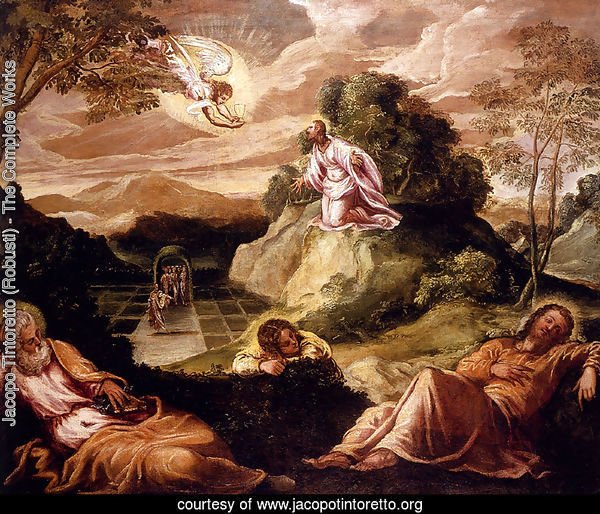As a meditation, I propose the agony in the garden, particularly how the apostles slept while Our Lord agonized in prayer in preparation for his Passion and Death. One of the antiphons sang on Maundy Thursday says, "Un hora non posuistes vigilare mecum qui exhortabamini mori pro me." (Could you not watch with me for one hour, you who claimed would die for me?)
These are moving words from Our Lord to the apostles. The apostles slumbered. It was probably not the best of sleep. How can it be if they were in the middle of the garden. Many grown men are picky about the sleeping arrangements. A month ago, we went camping in Big Bend, TX and I had nothing but a sleeping mat. I tossed and turned all night long during the three day hike. The apostles didn't even have a sleeping mat. Most likely, they sat against a rock or maybe even abandoned all propriety and just sprawled right on the ground.
At any rate, whatever their comfort level was, they were not being "vigilant," or "watchful" as some translate it. It's important to get some perspective on the word Our Lord used. Vigilare is not simply to watch, as in to see something that is happening. The word can denote the attitude of a nightwatchmen as he watches over the walls of the city for all possible dangers.
The response to this antiphon drives this point home. "Can you not see Judas? How he sleeps not, but rushes to deliver Me to the Jews?"
Why is it that the good are always tempted to slumber or to be inactive while the Judas' of this world are capable of depriving themselves of rest and comfort.
It is the opinion of Prof. Plinio Correa de Oliveira, arguably the greatest counterrevolutionary of the 20th century, that if the apostles had done as Jesus had requested, they would not have fallen into temptation. This means they would have been arrested with Jesus, scourged with Him, condemned with Him, crucified with him and perhaps resurrected with him. How different the beginning of the Church would have been?
With vigilance comes other corollary virtues like heroism, courage and activism. We argue this because it is proper for the nightwatchmen to be alert when all others slumber, to defend the weak, to anticipate all dangers, to unravel every plot, to outsmart the enemy, and to defend the city if need be with his life.
The nightwatchman is the first line of defense.
By asking the apostles to be watchful, he wasn't asking for the "innocence" of the dove. He was asking them to be more cunning that the serpent.
There is a corollary point that is essential to the virtue of vigilance. It is the recognition that evil exists and it is constantly plotting against Christ. The Judases of this world do not slumber. They care not for the comforts of life and the pleasures of the world.
Unfortunately, modernism has led is to believe that real evil does not exist, that no one could possibly be evil enough to plot against the Church. This denies that the serpent is always striking at Mary's heel.
Well, it is. And constantly.
The connection between Jesus' agony in the garden and the spirit of chivalry id's the virtue of vigilance.
It is curious that today much has been focused on the virtue of prayer. Even though Our Lord's request was bi-fold: pray and be vigilant.
The spirit of chivalry focuses on this specific virtue.
The nightwatchman is the first line of defense.
By asking the apostles to be watchful, he wasn't asking for the "innocence" of the dove. He was asking them to be more cunning that the serpent.
There is a corollary point that is essential to the virtue of vigilance. It is the recognition that evil exists and it is constantly plotting against Christ. The Judases of this world do not slumber. They care not for the comforts of life and the pleasures of the world.
Unfortunately, modernism has led is to believe that real evil does not exist, that no one could possibly be evil enough to plot against the Church. This denies that the serpent is always striking at Mary's heel.
Well, it is. And constantly.
The connection between Jesus' agony in the garden and the spirit of chivalry id's the virtue of vigilance.
It is curious that today much has been focused on the virtue of prayer. Even though Our Lord's request was bi-fold: pray and be vigilant.
The spirit of chivalry focuses on this specific virtue.


No comments:
Post a Comment